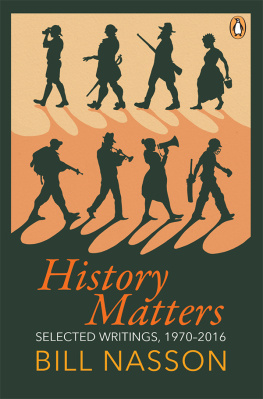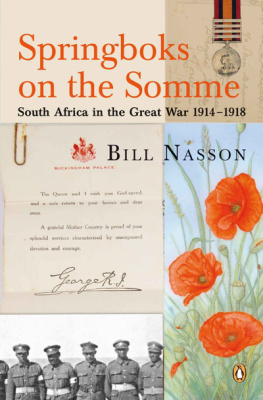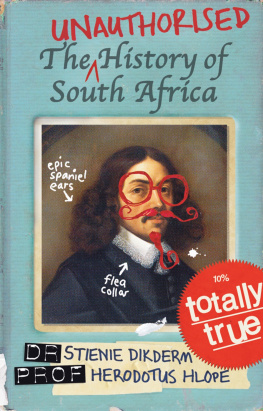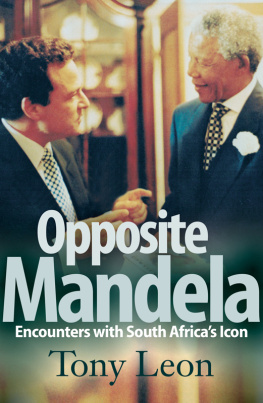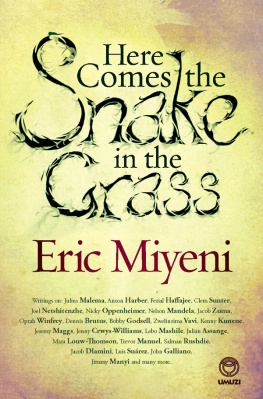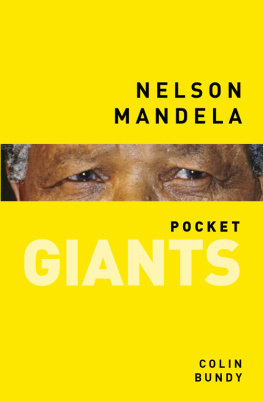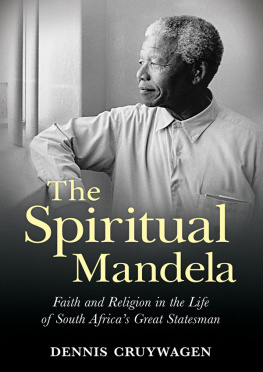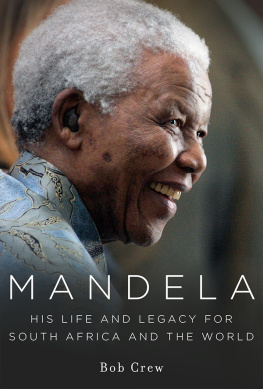
Published by Penguin Books
an imprint of Penguin Random House South Africa (Pty) Ltd
Reg. No. 1953 / 000441 /
The Estuaries No. , Oxbow Crescent, Century Avenue, Century City, 7441
PO Box 1144 , Cape Town, 8000 , South Africa
www.penguinrandomhouse.co.za

First published 2016
Publication Penguin Random House 2016
Text Bill Nasson 2016
All rights reserved. No part of this publication may be reproduced, stored in a retrieval system or transmitted, in any form or by any means, electronic, mechanical, photocopying, recording or otherwise, without the prior written permission of the copyright owners.
Publisher: Marlene Fryer
Managing editor: Robert Plummer
Proofreader: Genevieve Adams
Cover designer: Gretchen van der Byl
Set in 10.5 pt on pt Minion
ISBN 978 1 77609 027 3 (print)
ISBN 978 1 77609 028 0 (ePub)
In memory of R.O. Dudley ( 19242009 ), a teachers teacher
Contents
Foreword
F ROM THE SUBTLE ambiguity of the title to the satirical endings, this book is a delight. This is not surprising from someone with the highest academic qualifications (genuine, not fake), who has a distinguished list of publications and has been awarded fellowships at a number of prestigious institutions. It is a special book, the collected wisdom of Bill Nasson.
The books chapters are of three main types: his early life and schooling, book reviews, and pure history. The quality of the writing is such that it makes one say, Thats so good, I want to carry on. Certainly that was my reaction.
The dedication of teachers in the Western Cape in the teeth of political and social adversity in the 1960 s and 1970 s can be seen at least in part in distinguished products like Bill Nasson and writer Richard Rive. Chief among these teachers at Bills school, Livingstone High, was Richard Dudley, a man who was wholly contemptuous of any idea of ethnic identity and mockingly disdainful of political populism. Implacably so, it is clear, when it came out that Dudley declined Mandelas request to mobilise coloured voters for the 1994 election and turned down the offer of a cabinet post.
Glimpses of these influences can be seen throughout Bills writing.
Nowadays, especially in newspapers, book reviewing is not taken too seriously. So Bills should not be glossed over. Those like the ones on cricket, or boring old Lord Milner, or post-apartheid biographies each different and like a short story are hugely perceptive and informative. The amount of research done and serious attention given is invariably impressive. As with the best travel articles, one comes away thinking, I didnt know that!
In fact, for any young reviewer, or, for that matter, any older ones wanting to sharpen their craft, these reviews are worth studying as models for style and technique.
Present-day politicians are quick to assert the past absence or neglect of black history. This mantra is simply not true. There was always a trickle of black writers like J.H. Soga, John Dube, S. Molema, Sol Plaatje, A.C. Jordan, Albert Luthuli, and African-language newspapers dating back to the 1880 s for those who troubled to look for them. In addition, from the 1960 s a wave of hugely capable historians have produced a substantial body of ground-breaking work. Bill Nasson is one of them.
The language and rhetoric of populisms and racial nationalisms have never sat well with Bill, because of their simplifications, lacking as they do complexity, subtleties, exceptions and eccentricities. The condemnation of misappropriations or distortions is often just below the surface of his writing. There is a fine example of this (on page ), when he was asked to address an assembly in St Georges Cathedral in Cape Town, commemorating the South African War rural resistance figure, Abraham Esau:
In my address, I cautioned against getting carried away, of looking back at the story on the basis of retrospective reflections and rationalisations, instead of paying heed to what the voices of that time were saying. In other words, it was important to be wary of unitary or seamless notions of freedom fighter martyrdom in national liberation history. Equally, with the terminal condition of apartheid history obvious to everyone, there was a need to try to ensure that old Afrikaner nationalist mythologies, like that of the blood sacrifice of Jopie Fourie in the 1914 Rebellion, were not replaced by simplistic new nationalistic versions, in which we merely exchange one set of heroes for another.
A courageous, if not popular, warning to the simplifiers or their followers. So why does history matter? Because, as Bill writes elsewhere, in illuminating the pasts complexities, the power of history can challenge the more unreasoning forces which stalk the posturing present. He might well go along with the anonymous writer who said, Maybe there is no final draft only addition and revision, praise and debunking, the endless spin and counter-spin of ideology and propaganda. Unfortunately history that is corrupted by laziness, by ideology, by political correctness, by sentimentality, by money does the work of darkness. Which is to say that, in the absence of truth, bad people prosper.
Some of the history chapters are forerunners of Bills major publications. One chapter starts on page and is a harbinger to his first book, Abraham Esaus War ( 1991 ). It is the story of a coloured resistance leader elevated in the end to martyrdom by his own community.
Biography is not easy. On the one hand one needs as far as possible to empathise with the biographical protagonist, to get inside that persons mind, understanding their motives and actions; on the other hand, one needs some sort of critical detachment, objectivity, location in context. This is what might be called the biographers paradox. Because both these things, apparently contradictory, must be done at the same time .
Bills biographical article on Abraham Esau and his subsequent full book became part of the old guerrilla fighters myth, circulating with some stealth within a local community. So it had an effect long beyond these immediate publications. Bill tells this story in the chapter starting on page . Partly because of this and partly because of nearly finding the holy grail of the biographers paradox, empathy and independence, Abraham Esaus War is one of the classics of revisionist history post the 1960 s.
Two of the later books that Bill is noted for are about the First World War, Springboks on the Somme and WWI and the People of South Africa . That war is represented here by two fascinating public lectures: one about Jan Smutss ambitions for a Greater South Africa as a result of the war; and one exploring the links between the Afrikaner Rebellion of 1914 and the Easter Rising of 1916 . Each of these is a fascinating look at the war from an original and typically well-researched angle.
Not only is he a popular university teacher, for those who know him Bill has a quiet, sharp, and very serious sense of humour. This can be missed because it is often extremely subtle. But it allows detachment because thats what humour does.
This leads on to something else. While all the chapters in this book are self-contained, like epiphanies, together they are also more than the sum of their parts. They complete Bills overall literary production, making the major parts his books more accessible. His entire work now has an overall and rounded quality to it. It is complete.
At the same time there are hints here of Bills own life. Especially in a chapter towards the end of the book, which should in no way be skipped. He was in recent years drawn into participating in a film shot in Cape Town. The film is called The Deal and stars Meg Ryan, William H. Macy and Elliott Gould. One must, up front, be warned and not raise expectations too high. Bill does not play the role of Meg Ryans lover (in real life he is, after all, a respectable family man). Ms Ryan should in any case have been so lucky to bag such an eminent academic! Instead, typically, as a biographer and historian, and following the injunction of James Joyce, he refined himself almost out of existence like the God of Creation. Almost, but not quite.
Next page
